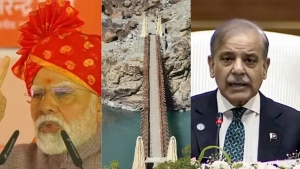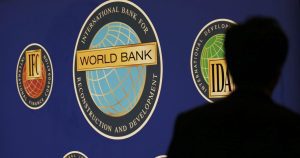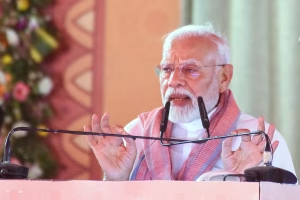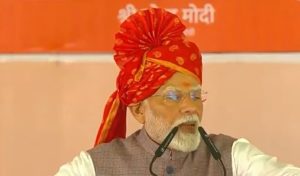Bikaner, Rajasthan – The latest chapter of Modi Pakistan Water Crisis in South Asian geopolitical tensions has emerged as water resources become a weapon of diplomacy between two nuclear-armed neighbors. This development of Modi Pakistan Water Crisis represents one of the most serious threats to regional stability in recent years, with implications that extend far beyond bilateral relations.
Prime Minister’s Strong Warning on Water Access
Prime Minister Narendra Modi delivered a stern warning that has sent shockwaves across the region, declaring that Pakistan will not receive water from rivers over which India maintains control. This unprecedented statement is now widely recognized as the Modi Pakistan Water warning and marks a dramatic escalation in the ongoing dispute between the two nations following recent security incidents.

Speaking at a public gathering in Rajasthan, a northwestern state that shares borders with Pakistan, Modi used the strongest language yet from Indian leadership regarding water resource management and bilateral cooperation. The Modi Pakistan Water controversy has taken center stage in India’s foreign policy discourse, signaling a shift in how India intends to handle future diplomatic standoffs.
Modi’s declaration comes at a time when both nations are grappling with the aftermath of violent incidents that have strained their already fragile relationship. The timing of these statements suggests a coordinated approach to applying economic and environmental pressure as part of a broader diplomatic strategy under the Modi Pakistan Water framework.
Also Read: Trump Harvard Ban News: International Students Face Enrollment Crisis
Historical Context of the Indus Waters Treaty


The Indus Waters Treaty, negotiated through World Bank mediation in 1960, has served as a cornerstone of water management between India and Pakistan for over six decades. This agreement guarantees Pakistan access to water resources essential for approximately 80% of the country’s agricultural operations, making it crucial for food security and economic stability.
The three western rivers – Indus, Jhelum, and Chenab – flow from Indian-administered territories into Pakistan, forming the backbone of its irrigation network. The Modi Pakistan Water dispute now threatens to unravel this long-standing arrangement, potentially creating humanitarian and economic upheaval across the region.
Despite numerous wars and diplomatic rifts, the treaty has held, serving as an example of successful conflict management. However, the Modi Pakistan Water controversy reveals cracks in this framework, raising questions about its resilience in the face of escalating security tensions.
Pakistan’s Legal Response and Position


Pakistan’s Attorney General, Mansoor Usman Awan, has responded firmly to the Modi Pakistan Water threat by emphasizing Islamabad’s continued commitment to dialogue and negotiation. He maintains that Pakistan remains willing to address any legitimate concerns raised by Indian authorities regarding water-sharing arrangements.
Legal experts in Pakistan argue that the Indus Waters Treaty cannot be altered unilaterally. Any modification must occur through mutual agreement and within established legal frameworks. The Modi Pakistan Water stance, according to Pakistani officials, undermines this legal precedent and threatens regional cooperation mechanisms.
Pakistan’s willingness to discuss factors such as population growth and the demand for clean energy reflects a flexible stance. However, they insist that all negotiations should respect the treaty’s foundational principles. The Modi Pakistan Water discourse has therefore become a litmus test for South Asia’s commitment to international legal norms.
Security Incidents and Escalating Tensions
The current Modi Pakistan Water crisis stems from an April 22 attack in Indian-controlled Kashmir, which New Delhi has attributed to Pakistani involvement. This violent episode triggered a cascade of retaliatory actions from the Indian government, including threatening to suspend the Indus Waters Treaty.


Pakistan categorically denies any involvement in the Kashmir attack and maintains its position that it does not support or harbor militant activity. Nevertheless, the Modi Pakistan Water controversy has become one of the most significant political and diplomatic repercussions of these mutual accusations.
The situation further deteriorated with a suicide bombing in Pakistan’s Balochistan province, which targeted a school bus. Pakistani authorities blamed Indian proxies, an allegation India strongly refuted. These developments continue to feed into the escalating narrative surrounding the Modi Pakistan Water issue.
Military Ceasefire and Current Status
Despite the aggressive rhetoric and threats surrounding the Modi Pakistan Water debate, both countries have thus far adhered to a military ceasefire initiated on May 10. This agreement has largely held, offering a narrow window for diplomacy and potential conflict de-escalation.
Indian Foreign Minister Subrahmanyam Jaishankar confirmed that no active military engagements have occurred since the ceasefire, although counter-terror operations continue. India has emphasized that its actions, including those tied to the Modi Pakistan Water strategy, are intended to safeguard national interests without initiating open conflict.
Pakistan, meanwhile, has signaled its preference for dialogue and has called on international actors to mediate the situation. The military pause provides both sides with an opportunity to recalibrate their positions in the face of the growing Modi Pakistan Water standoff.
Economic and Agricultural Implications
The Modi Pakistan Water warning holds severe implications for Pakistan’s economy. Agriculture forms a critical pillar of Pakistan’s GDP and employs a substantial portion of the labor force. Much of this agriculture is dependent on irrigation from rivers governed by the Indus Waters Treaty.
Should India move to restrict water flow, even partially, it could devastate Pakistan’s food production capabilities. This would result in widespread food shortages, unemployment, and potentially mass displacements in rural communities. The Modi Pakistan Water controversy thus carries the risk of escalating into a humanitarian crisis.
Experts warn that the use of essential resources like water as political leverage violates ethical standards and international norms. Yet, under the Modi Pakistan Water stance, India appears to be recalibrating its strategic toolkit to include such leverage in response to persistent security threats.
International Mediation and World Bank Role
The World Bank, which played a central role in the creation of the Indus Waters Treaty, may once again be called upon to mediate the Modi Pakistan Water issue. International calls for intervention have grown louder, particularly from legal scholars and environmental watchdogs concerned about the long-term implications.


The Modi Pakistan Water situation is now being closely monitored by global institutions, which argue that the water-sharing dispute transcends bilateral politics. The treaty is seen as a model for resolving transboundary water conflicts and must be preserved, according to numerous international observers.
The prospect of neutral arbitration under the World Bank could provide both sides with a face-saving exit strategy. It would also reinforce the importance of legal and diplomatic frameworks in resolving modern-day geopolitical challenges like the Modi Pakistan Water crisis.
Regional Security Implications
The Modi Pakistan Water controversy does not exist in isolation—it intersects with broader regional dynamics involving terrorism, military deployments, and nuclear deterrence. The possibility of escalation remains a real concern among regional analysts and international think tanks.
Both nations possess nuclear weapons and have engaged in three wars since their independence. The current Modi Pakistan Water dispute introduces a new variable into this volatile equation, potentially triggering a chain reaction that could destabilize all of South Asia.
The dispute over Kashmir remains central to many of these tensions. With Kashmir’s rivers feeding directly into Pakistan’s water infrastructure, the Modi Pakistan Water discourse cannot be separated from territorial considerations and historical grievances that continue to divide the two nations.
Future Prospects and Resolution Pathways

Despite the hostilities, both governments have signaled a tentative openness to dialogue. Pakistani officials have expressed willingness to engage on water-sharing concerns, provided discussions occur within the Indus Waters Treaty framework. This presents a narrow but critical diplomatic opening to address the Modi Pakistan Water impasse.
India, too, has not entirely ruled out discussions. The key will be identifying common ground that allows both sides to de-escalate without appearing to compromise core national interests. The Modi Pakistan Water crisis offers an opportunity to revisit not just treaty terms but also larger issues of resource cooperation and conflict prevention.
Behind-the-scenes diplomacy, possibly involving international mediators, may offer the most viable route forward. Historically, such backchannel efforts have averted conflict between India and Pakistan, and the same approach might be required to defuse the Modi Pakistan Water standoff.
Closing Statements: A Test for Regional Resilience
The Modi Pakistan Water dispute is a litmus test for South Asia’s ability to manage complex, high-stakes conflicts without resorting to warfare. It also challenges international norms regarding the use of natural resources as political instruments.


As populations grow and climate change accelerates, competition over shared resources like water is likely to become more intense. The Modi Pakistan Water controversy offers a cautionary tale about the dangers of politicizing access to these vital lifelines.
In the end, the resolution of this crisis will determine whether India and Pakistan can rise above their historical animosities and embrace a future based on mutual respect and cooperative governance. Until then, the world watches as the Modi Pakistan Water debate continues to shape the course of South Asian diplomacy.

